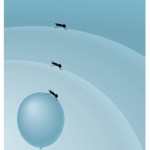Uncategorized
Did you actually make it through that?? Did you catch the strange reason why the sea is blue? Apparently the ocean is a mirror (not entirely false) that reflects the blue sky, hence it is blue (not entirely true). Some hypothesize that the ocean is blue because it reflects the blue sky, but this would only be visible at relatively low angles of observation and on flat water.
So why is the ocean blue? Water itself isn't blue, right?
The most widely-held hypothesis is that blue wavelengths of light penetrates deeper while red wavelengths are rapidly absorbed by the water molecules and…
Following a number of reader requests (thanks for the feedback!) I've compiled a list of the most read posts from this blog, excluding those that were heavily visited but that were timely and thus not likely relevant now. The list is divided into rough categories, and I've placed it here, on my About page.
I'll update this now and then. If there is anything else you want to see on there, let me know.
Also, my blogroll has finally reached the "Z's" ... so in a few days I'll be updating that and running out a new set. If you'd like to be added to my blog roll, let me know. If you are not…
Starts with a bang reader Zrinka asks us how rainbows work, and that's a great question for the weekend, since I'm driving up to Portland, OR right now. (The desert is lousy for rainbows when it doesn't rain!) So you've seen something like this before, although maybe yours isn't as famous as Galen Rowell's:
So how do you make one? Well, this works just like light passing through a prism will separate into its colors, because the longer wavelength light travels faster in any medium. So red light has a longer wavelength than purple, and so not only travels faster through glass or water than…
I generally skim only a few political/public policy weblogs via my RSS to get a sense of the Zeitgeist. M. McArdle and M. Yglesias are two of the blogs I sample. Anyway, if you read their blogs, check out the latest installment of The Table, the intro is really hilarious. Most-def trying to do the Gen-X ironic thing.
It's long been recognized that American kids suck at math, at least when compared to kids in Singapore, Finland, etc. What's less well known is that the steep decline in proficiency only starts when kids are taught algebra. That, at least, is the conclusion of a new government report:
"The sharp falloff in mathematics achievement in the U.S. begins as students reach late middle school, where, for more and more students, algebra course work begins," said the report of the National Mathematics Advisory Panel, appointed two years ago by President Bush. "Students who complete Algebra II are more…
A Cow Mourning For Her Calf
Oft at some consecrated altar-side,Where fragrant incense burns, a calf lies slain,And from his breast breathes out the warm life-tide:But the lone mother, o’er the grassy landFar ranging, sees his cloven hoof-prints plain,And leaves with roving eyes no spot unscannedFor her lost young, and fills with lowings wildThe shady wood; then tireless turns againTo the bare stall, sore stricken for her child.Naught can the dewy grass, or tender leaf,Or brimming river-bank, once fondly known,Avail to bannish that o’er-mastering grief;Nor by the sight of other calves,…
It is with great sadness I report the passing away of one of the world's greatest carcinologists, L.B. Holthuis. A carcinologist studies crustaceans and he contributed to the knowledge of many diverse types of crustaceans. A little about him from a Wikipedia entry:
"Holthuis was born in Probolingo, Java and obtained his doctorate from Leiden University in 1946. He was appointed the assistant curator of the Rijksmuseum van Natuurlijke Historie (now Naturalis) in Leiden in 1941. He was the most prolific carcinologist of the 20th century, publishing more than 400 papers and books on many groups…
The deep-sea octopus, Bathypolypus arcticus, hatching. Dr. James Wood discusses the biology and ecology of the species here.
Credit to NOC and Deepscape.org: Coarse rocky ground with cirrate octopus (Cephalopod) above the seabed taken at 1126m in the Faroe-Shetland Channel. Others great images can be viewed by searching around their image bank.
From TOL:
The Cirrata contains about 40 species many of which are poorly known and of uncertain status...One of the most distinctive features of this group and the feature from which it derives its name, is the presence of cirri. The oral view of the arms and web of a cirrate below barely shows the cirri lining the arms but the insert show the cirri clearly. The cirri are…
This month's issue of Physics Today has an interesting article by Robert Brandenberger of McGill University, entitled Alternatives to Cosmological Inflation. As a refresher, cosmological inflation is the theory that sets up the Big Bang: it takes whatever was in the Universe prior to inflation and expands it away, leaving you with a Universe that has roughly (to a few parts in 100,000) the same properties everywhere, and is spatially flat.
There are many models of inflation which give a Universe like ours, although we have to fine-tune the parameters of it. For instance, if we treat…
Flavylium is an unusual heterocycle - it has a trivalent oxygen atom. These tend to be quite reactive - trialkyloxoniums, some of the most potent alkylating agents, contain them.
As in the case of tropylium, aromaticity saves the day again. What should be a very unstable compound ends up being fine even in water.
You might know flavylium from such pigments as cyanidin and delphinidin.
You read the title of this post, and the original paper, correctly. Brian H. sent this little gem of a paper to me today. Using SeaWiFS data from the last nine years, Polovina et al. show that in the North and South Pacific and Atlantic areas of low surface chlorophyll are in expanding by 0.8-4.3% per year. These areas have replaced higher surface chlorophyll with low surface area. The total expansion of these areas equals 6.6 million km2 (roughly 2/3 the size of the U.S.). The figure below shows a time series and regression line for the area with surface chlorophyll less than or equal to…
Public Access Public MeetingThe NIH is hosting an Open meeting on public access (Bethesda, March 20, 2008). The purpose of the meeting is to air public comments on the new NIH OA policy. The agency is soliciting public comments in advance of the meeting, and about 50 commenters will be given five minutes each to present their comments to the meeting (total: four hours).
Comment. This meeting is one NIH response to publisher complaints that the new policy is based on insufficient public consultation. (See my latest response to that complaint.) Publishers are sure to send in their…
Because some people seem to be misinterpreting what I was saying in the last post, and even arguing against it by suggesting that I should have taken the position that I did, in fact, take, let me summarize my points in a few sentences.
The main point is that because I don't feel like I can be objectively certain about things about which there is so much more that we don't know than that we do, and which are incredibly complex even in their simplest forms, like religion, truth and falsity seem like poor measures of belief in assigning respect to them or their holders. What's more important,…
Via bookslut comes a heartbreaking excerpt from Roger Deakin's Wildwood: A Journey Through Trees:
[Konrad] Lorenz observed that jackdaws form lifelong attachments, as rooks seem to do, and that there is a distinct, well-understood pecking order within the tribe to which all the members adhere without question. Lorenz gradually learnt the Jackdaw vocabulary: 'Zick, Zick' is uttered by the courting male to mean 'Let's nest together' and, once in possession of an actual mate and nest, 'Keep out.' Any act of social delinquency is immediately censured by the other tribe members with a variation of…
One last note on the whole Spitzer affair. The reason I think it's dangerous to use the sexual habits of other species (or even other human cultures) as a baseline when discussing prostitution is that the evolutionary argument has very clear policy implications. If, as David Barash argued, sexual infidelity is not only natural but normal and inescapable, then you'd have a strong argument for the legalization of prostitution. (Let's call this the Netherlands model.) After all, why criminalize what can't be helped?
However, if you believe that our sexual urges, while powerful, can still be…
Martin is in a protracted Wikipedia battle with a cult, Falun Gong, that is trying to erase unpleasant aspects of their ideology from the record. I know there are a few dedicated Wikipedians aroung these parts, so you might want to help him out.

